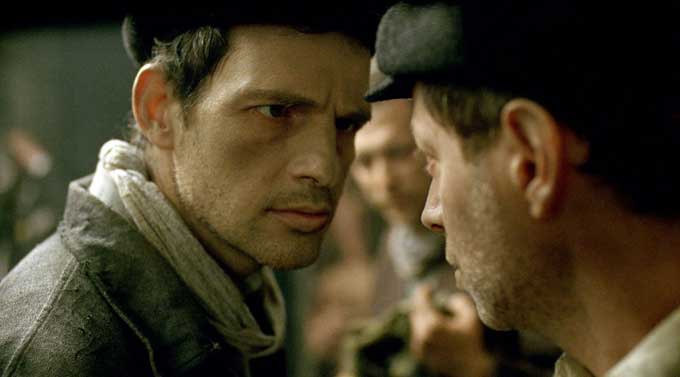Son of Saul
by Jordan Canahai

Rendered with a near-apocalyptic dread and a fittingly heavy sense of sorrow, the Hungarian Holocaust drama Son of Saul is a full-force immersion into one of the darkest chapters of human history. Writer/director Laszlo Nemes opens his film with an intricate, Dardenne-influenced tracking shot that follows Saul (Geza Rohrig) as he goes about his daily routine of herding fellow Auschwitz concentration camp prisoners to their deaths. Saul is a member of the camp’s Sonderkommando; prisoners tasked by the Nazis with assisting in the genocide of other Jews, thus delaying their own death for a brief time. In telling his story Nemes employs frequent close-ups and keeps much of the action slightly out of focus, a shooting strategy which serves to not only shield us as audiences from witnessing the horrific action in unbearable detail, but to also reflect the point of view of his subject. Living on borrowed time and complicit in crimes of war, Saul has learned to shut out the surrounding atrocities as a means of dealing with his actions in his final days.
A seed of empathy is soon planted amidst this Hell on Earth, however. Saul is shaken out of his state of deadening numbness when he becomes convinced that a dying boy whose final moments he witnessed is in fact his illegitimate son. Overcome with a sense of obligation, Saul becomes determined to find a Rabbi in the death camp who can secure the boy a proper Jewish burial, a near-impossible feat while under the watchful eyes of his captors. Despite the heaviness of the subject matter, what’s most surprising about Son of Saul is how unusually gripping the taut narrative is. Throughout the 100-minute runtime the film’s tension and momentum never lets up. Son of Saul also shows the inner-workings and mechanisms of a concentration camp and the more routine aspects of Hitler’s final solution with acute detail, laying bear the infamous “banality of evil” which allowed places like Auschwitz to function. Despite that, Son of Saul also documents how the culture and aspirations of the Jewish people could survive even in such a place, as Saul is eventually revealed to be part of a secret resistance movement made up of other Sonderkommandos who’ve been plotting to escape their Nazi captors through hushed whispers exchanged in the hidden corners of the camp. From here, Son of Saul transforms into a spiritual and moral inquiry, as Saul must choose between his newfound mission and his role in the escape plan.
Films about the holocaust must always tread careful ground, as films as diverse as Schindler’s List and Inglorious Basterds have attempted to transform such a terrible event into commercial works. The late Stanley Kubrick famously abandoned a holocaust film he’d invested years researching, believing the scope of the atrocity was beyond the power of film to convey. While it’s certainly understandable why some would question Son of Saul’s purpose as a thriller, Nemes and his collaborators deserve credit for resisting moments of easy sentimentality. Saul is not a one-dimensional hero but rather a complex, flawed human that the largely unknown Rohrig brings to life with the utmost believability; his unblinking gaze and haunted eyes convey a world of suffering that takes on a quality of intense determination as Saul becomes more desperate to atone for his failures. First time director Nemes proves immensely talented at staging his action, making extraordinary use of space and scale within the frame in a manner that recalls Bela Tarr, the Hungarian master who Nemes previous collaborated with on Werckmeister Harmonies. In addition to first-rate sound and production design, Matyas Erdely’s immediate and claustrophobic cinematography is also outstanding, adding greatly to the film’s visceral power.
Of course, the question of whether or not the boy whom Saul is seeking to lay to rest is really his son proves to be of little importance by the film’s final moments, as Son of Saul is ultimately the story of how one man is able to rediscover his humanity in the most inhumane of places. It’s a devastating film, but also a cautiously hopeful one, and if it does earn the Oscar for Best Foreign Language film at the Academy Awards this Sunday as many predict, the win will have been well deserved.
blog comments powered by Disqus|
Issue Navigation> Issue Index > v15n08 (Week of Thursday, February 25) > Son of Saul This Week's Issue • Artvoice Daily • Artvoice TV • Events Calendar • Classifieds |









 Current Issue
Current Issue